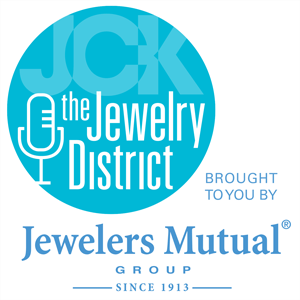
In this Episode
In this episode of The Jewelry District you’ll hear JCK editor-in-chief Victoria Gomelsky and news director Rob Bates interview Abe Sherman, founder and CEO of the Buyers Intelligence Group. You’ll hear Abe talk about why it is so important for jewelry retailers to carefully manage their inventory and balance sheets during the COVID-19 crisis.
Listen Now
Show Notes
00:30 Introduction of Abe Sherman
3:24 Rob asks Abe if there is anything he knows now that he wishes he knew earlier
7:44 Victoria asks how our current situation is impacted by the COVID-19 crisis
12:28 Rob asks about operational cost cuts, Victoria asks about what Abe says to suppliers, Rob asks about reserve funds
21:03 They discuss what will happen post-COVID-19, what jewelry will be popular, how to best advertise, and getting your online presence in order
Episode Credits
Hosts: Rob Bates and Victoria Gomelsky
Editor: Olivia Briley
Producer and engineer: Katey Clifford and Kathy Passero
Plugs: jckonline.com, @jckmagazine
Show Recap
Abe Sherman, Founder and CEO of Buyers Intelligence Group
Abe started working for his father at their family jewelry store in 1968, when he was just 10 years old. Over his years in the jewelry industry, he has become quite the expert. His company, Buyers Intelligence Group, started as a buying group, and now they do financial and inventory benchmarking. Abe explains that his company helps jewelers take the numbers from the income statement of their balance sheet and explains how to use those numbers to help their businesses.
The Jewelry Business Is Tough. The Family Jewelry Business Is Tougher
Rob asks Abe if there’s anything that he knows now that he wishes he knew when he was first starting out. Abe gives a bit of background on his family business. Inventory planning, inventory management, marketing, and positioning were all things they didn’t completely understand back in the ’60s and ’70s, but are more important now than ever—especially with the internet connecting us all globally. Additionally, Abe argues the jewelry industry operates different than any other—and this added complication is something he helps companies to work through.
Looking Ahead to a Post-COVID-19 World
Victoria asks Abe how our current situation is impacted by the pandemic. Abe says that going forward, cash flow is going to be a challenge. Jewelry doesn’t have an expiration date like other industries, like food or car industries—so jewelers tend to hold on to their inventory. Abe stresses and explains how re-merchandising can be the answer to some problems people are having with getting older and nonperforming inventory out the door—and how this could help get cash back into the pockets of jewelers.
What to Do on the Operational Side?
Everyone is trying to figure out how to get out on the other side of this crisis in the best position they can. Abe suggests starting by visiting your CPA to study your reports line by line for every expense that comes into the company. Jewelers should prioritize cash-flow planning for the next six months. As for a reserve fund, jewelers should try to put away a small percentage of their monthly sales to build up the money they have for emergencies. Abe also gives helpful tips for jewelry pricing and price points.
Online Presence, Advertising, and Popular Jewelry Post-COVID-19
Abe recaps the most important things for getting retailers back on track in the coming months. Victoria wonders what categories and types of jewelry might sell later in the year and asks about the bridal category in particular. Rob asks if Abe believes retail will continue its shrinking trend while emphasizing how important small business are. Victoria asks Abe about navigating jewelers’ online presence, and Rob asks about best advertising practices during this time.
- Subscribe to the JCK News Daily
- Subscribe to the JCK Special Report
- Follow JCK on Instagram: @jckmagazine
- Follow JCK on X: @jckmagazine
- Follow JCK on Facebook: @jckmagazine